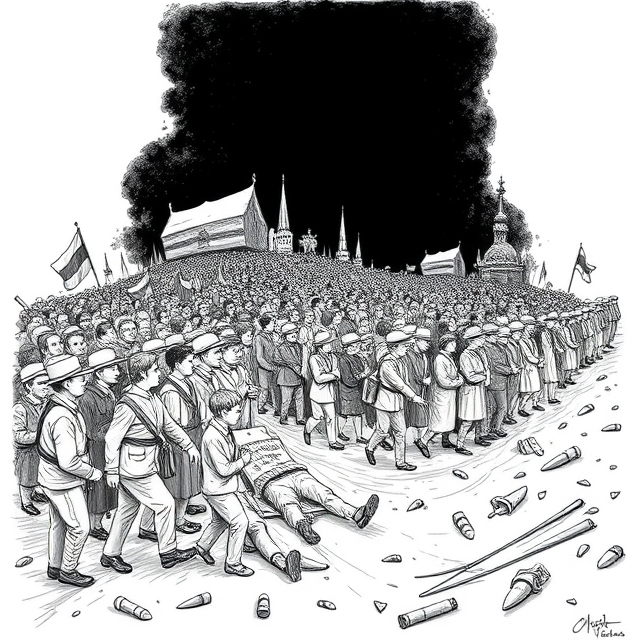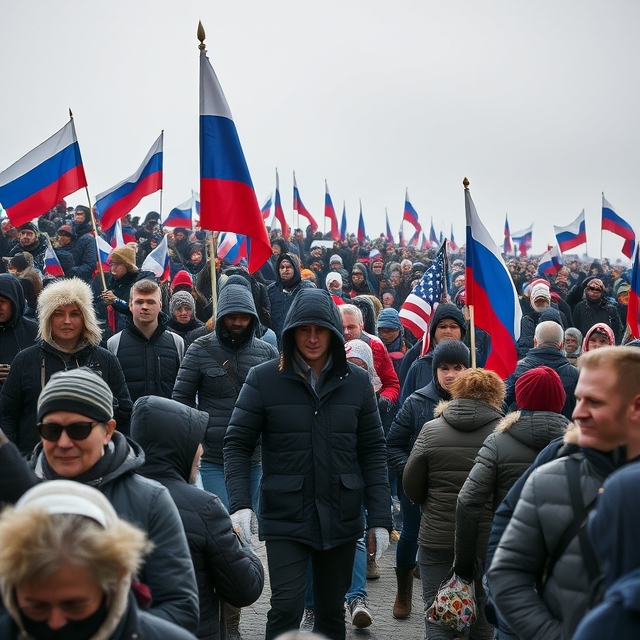
- Anti-Migrant Scapegoating: The murder of General Igor Kirillov has triggered rising anti-migrant sentiments in Russia, with Central Asian migrants facing discrimination and collective blame.
- Political and Economic Fallout: Russia’s crackdown on migrants may strain its relations with Central Asian nations, whose economies heavily depend on remittances from migrant workers.
- Weaponized Rhetoric: Russian authorities and media are amplifying xenophobic narratives, framing migrants as security threats amidst the ongoing Ukraine conflict, escalating societal tensions.
The political storm brewing in Russia following the shocking murder of General Igor Kirillov is not merely a tragic event—it is rapidly morphing into a dire societal issue. Anti-migrant sentiments, which have been simmering beneath the surface, have now bubbled over, fueled by populist media outlets and bloggers urging the Kremlin to tighten its already oppressive migration policies. Amid the chaos, experts warn that the situation could escalate further as Russian authorities may be attempting to redirect public frustration toward Central Asian migrants to secure internal social stability.
The tragedy unfolded when Russian authorities arrested an Uzbek man, Akhmadjon Kurbonov, accusing him of being recruited by Ukrainian security services to carry out the assassination. The media claims that Kurbonov, allegedly a hired assassin, murdered both Kirillov and his assistant, Ilya Polikarpov, with the ultimate promise of financial reward and residency in Europe. This narrative, however, has been met with scepticism across Uzbekistan. Citizens in the Central Asian country are openly questioning the credibility of these allegations. Some commentators even speculate that the attack could have been part of a larger provocation aimed at stoking tensions in Russia. As posts on social media spread doubts about the official account, many begin to ask: why, if Kurbonov was behind the killing, does he appear so calm and unshaken, as though reading a script?

While many in Russia view this attack through the prism of rising terrorism fears, Uzbek citizens, especially the labour migrants working in Russia, are not only grappling with the shocking arrest but also with the horrifying possibility that the actions of a single individual will be unfairly blamed on entire communities. The fear of collective punishment and further discrimination has led to mounting anxiety within Central Asia’s migrant community in Russia, as illustrated by a chilling account from one Uzbek woman in Moscow. “There are police vans everywhere. Today, I was walking near a market and saw several police vans there, too. They detained everyone—Uzbeks, Kyrgyz, and Tajiks,” she said. This rising suspicion is not confined to Uzbek nationals alone. Videos from across Russia depict shocking racist incidents against migrants. Attacks and public humiliation aimed at Central Asians seem to be an unfortunate daily reality.
The Kremlin’s role in this escalating issue is troubling. Officials have weaponized this rhetoric, painting all migrants—especially those from Central Asia—as a threat. According to statements from the head of Russia’s Investigative Committee and others within the Federal Security Service, foreign-born workers are being framed as uneducated, radical elements. Migrants are also falsely portrayed as using their residency status to further undermine Russian security interests, especially in light of the ongoing conflict with Ukraine.
As anti-migrant sentiment rises, the economic consequences for Central Asian nations could be profound. With further crackdowns on migrant workers, who already endure poor working conditions and receive lower wages, Russia is set to exacerbate the economic strains on these nations. As migrant labour remains integral to many parts of the Russian economy, this shift may serve to drive a wedge in relations with neighbours, possibly pushing Central Asian governments to rethink their alliances with Moscow. Analysts predict that this is likely to escalate as internal Russian struggles intertwine with geopolitical tensions.
The rising tensions signal an impending shift. Igor Shestakov, from Kyrgyzstan’s Migration Council, pointed to a dangerous evolution of migrant issues from economic to political, increasingly linked to security fears in Russia. Despite the contractual protections provided under the Eurasian Economic Union for Kyrgyz and other migrant workers, this hardened rhetoric means a stricter environment for workers who now must navigate the dual pressure of potential deportation and rising animosity.

In sum, what started as the brutal murder of a general is becoming an unfortunate rallying cry for politicians, bloggers, and media outlets in Russia to align their domestic woes with heightened xenophobia. Central Asia is now tasked with responding to Moscow’s tightening grip, while citizens caught in the middle are suffering the consequences of a volatile situation they never imagined could spiral so far out of control. As Russia faces its internal security challenges, the rest of the world may see this as more than just an anti-migrant campaign, but the beginning of a new Cold War of exclusion and scapegoating.
References:
- Times of Central Asia. (2024, December 20). Anti-Migrant wave rises in Russia following general’s murder – The Times of Central Asia. The Times Of Central Asia. https://timesca.com/anti-migrant-wave-rises-in-russia-following-generals-murder/
- Verkhovsky, A. (2024, December 19). What is driving the intensifying anti-migration campaign in Russia? Russia Post. https://russiapost.info/politics/anti_migration_campaign
Shobhil Shrivastava is a postgraduate student specializing in Diplomacy, Law, and Business at O.P. Jindal Global University. His academic focus spans International Relations, Geopolitics, Defence, and Security. Views expressed are the author’s own.
